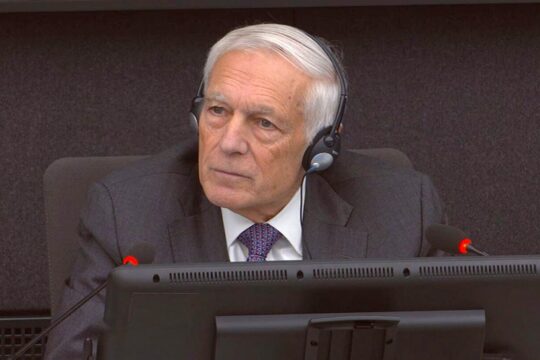Chad's former president Hissene Habre was to begin an appeal Monday against his life sentence for war crimes and crimes against humanity after his conviction was hailed as a landmark for Africa.
The Extraordinary African Chambers, a body created by Senegal and the African Union, sentenced Habre in May to life behind bars, an unprecedented ruling that was seen as a blow to the impunity long enjoyed by repressive rulers.
In July, Habre was further ordered to pay up to 30,000 euros ($33,000) to each victim who suffered rape, arbitrary detention and imprisonment during his rule, as well as to their relatives.
The 74-year-old has refused to recognise the court's authority but his court-appointed lawyers requested an appeal on his behalf.
"We were motivated to appeal by violations of the law and (the rights) of the defence and procedural errors," lawyer Mbaye Sene told AFP, saying he didn't want to reveal their "strategy".
It was not clear whether Habre, who ruled Chad from 1982 to 1990, would be in the dock on Monday, with court spokesman Marcel Mendy saying it was "unknown".
Ibrahima Diawara, another of Habre's lawyers, said his client was not planning to appear but could be compelled to do so by the court.
"Habre believes that this does not concern him at all. He will not appear. We will see whether the court will use force to force him to come," Diawara told AFP.
The hearing is expected to last several days, with the final decision expected by April 30.
The verdict will be final. If his conviction is upheld, Habre will serve his sentence in Senegal or in another AU country.
- 'Verdict that gave hope' -
The verdict brought closure for relatives of up to 40,000 people killed and many more kidnapped, raped or tortured during Habre's time as president.
"The trial of Hissene Habre last year was the result of a tireless battle by thousands of victims and their relatives to ensure justice for crimes under international law committed in Chad between 1982 and 1990," said Gaetan Mootoo, West Africa researcher at Amnesty International.
"It gave hope to others around the world that it is possible to end impunity even where it is most entrenched," he said in a statement ahead of the appeal.
The trial set a global precedent as the first time a country had prosecuted the former leader of another nation for rights abuses, said US lawyer Reed Brody, who has worked with the victims of the Habre regime since 1999.
"The appeals court now needs to make sure that a system is put in place so that Habre's assets can be located, seized and transferred to his victims to compensate them for what they have suffered," he said in a statement this week.
Known as a skilled desert fighter and often dressed in combat fatigues to fit the role, Habre fled to Senegal after his 1990 ouster by Chad's current President Idriss Deby.
For more than 20 years, the former dictator lived freely in an upmarket Dakar suburb with his wife and children.






